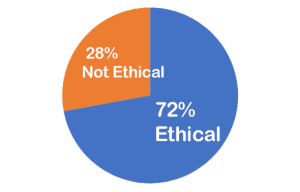This is the September 2024 edition of our monthly series of Ethics case studies titled What Do You Think? This series is comprised of case studies from NSPE archives, involving both real and hypothetical matters submitted by engineers, public officials, and members of the public.
Your peers and the NSPE Board of Ethical Review have reviewed the facts of the case as shown below. And, here are the results.
Your opinion has been registered for the September 2024 edition of our monthly series of Ethics case studies titled What Do You Think?
Your vote is recorded as:

Want to know how your peers voted? We’ll send you an email with the poll results on September 24.
Your opinion has been registered for the September 2024 edition of our monthly series of Ethics case studies titled What Do You Think?
Your vote is recorded as:

Want to know how your peers voted? We’ll send you an email with the poll results on September 24.
A Review of the Facts
Greenhill County decided to retain a private consulting engineering firm to perform building inspections. Greenhill County selects and retains Engineer Cathy’s firm. One of Cathy’s responsibilities is to inspect a building project developed by Enterprise, Inc., a company for which she has regularly performed services in the past. Although she did not provide any services in connection with the building project in question, Cathy and Enterprise, Inc., anticipate that they will continue to work together in the future. In contract negotiations with the county, Cathy discloses this relationship with Enterprise, Inc., and it becomes a matter of public record.
What Do You Think?
Would it be unethical for Cathy to perform building inspection services for the county in connection with the project developed by Enterprise, Inc.?
Here is the result of our survey of your peers:

Applicable NSPE Code References:
II.4
“Engineers shall act for each employer or client as faithful agents or trustees.”II.4.a
“Engineers shall disclose all known or potential conflicts of interest that could influence or appear to influence their judgment or the quality of their services.”
Discussion
Conflict of interest is one of the most frequent and least easily resolvable issues faced by the BER.
Case 76-3 involved an engineer who had been under a retainer with a county for general advisory services and long performed extensive engineering services for it. While still on the retainer, the engineer was retained by a developer with the approval of county officials. The developer filed a petition with the county board to rezone a substantial area of the county for commercial purposes. The county Department of Public Works filed several engineering reports adverse to the zoning petition, recommending denial of the rezoning because the proposed construction would overload available water-sewer facilities. The developer called the engineer as an expert witness at the hearing and he testified in support of the rezoning petition.
In ruling that it was unethical for the engineer to appear for the development company while serving as an engineering consultant to the county, the Board noted that he was doing more than offering his expertise in engineering matters as an aid to a fuller understanding by the zoning board; he was, in fact, a paid advocate of private interest in open conflict with the engineering opinions of the county engineers. The BER noted that the engineer was not required to agree with the county engineering staff or its reports, or even to support their position at the hearing. If the engineer chose to oppose that position on behalf of an adverse party he could ethically do so by first resigning from his role as adviser to the county.
In Case 85-6, the state, considering the construction of a highway spur, retained an engineer to perform certain feasibility studies relating to it. After learning that the spur would go through an area adjacent to the community in which he resided, the engineer informed the state that the new spur might affect his residential property, fully disclosing the potential conflict with the state. The state did not object to the engineer’s performing the work; he proceeded with his feasibility study and ultimately recommended that the highway spur be constructed, which was done.
In deciding that it was not unethical for the engineer to perform the feasibility study despite the fact that his land may be affected thereby, the Board noted that Code II.4.a. does not require the engineer to “avoid” any and all situations that may or may not raise the specter of a conflict of interest. We noted that such an interpretation of the Code would leave engineers with neither any real understanding of the ethical issue nor any guidance as to how to deal with the problem.
Turning to the facts of the instant case, unlike Case 76-3, we are not confronted with a situation where an engineer is being retained as a paid “advocate” for a particular position or point of view on a pending matter in direct conflict with the engineering opinions of her county client. Nor are we faced with a situation where the timing of the retainer raises a question of propriety. Rather, Cathy is being asked to perform basic inspection services in connection with a building with which she has never previously been involved, but which was developed by a former and possibly future client.
While we note that Cathy clearly has a professional obligation under Code II.4 and Code II.4.a. to disclose her relationship with Enterprise, Inc., to Greenhill County, we do not believe it would be necessary for her to decline to perform the inspection services. To prohibit Cathy from providing building inspection services would be an unrealistic intrusion into her practice and would inhibit the county from utilizing a flexible method of delivering services consistent with public health and safety.
The Ethical Review Board’s Conclusion

It would not be unethical for Cathy to perform building-inspection services for the county in connection with the project developed by Enterprise, Inc.
BOARD OF ETHICAL REVIEW
Eugene N. Bechamps, P.E.; Robert J. Haefeli, P.E.; Ernest C. James, P.E.; Robert W. Jarvis, P.E.; J. Kent Roberts, P.E.; Everett S. Thompson, P.E.; Herbert G. Koogle, P.E.-L.S., chairman
Note – In regard to the question of application of the Code to corporations vis-a-vis real persons, business form or type should not negate nor influence conformance of individuals to the Code. The Code deals with professional services, which services must be performed by real persons. Real persons in turn establish and implement policies within business structures. The Code is clearly written to apply to the Engineer and it is incumbent on a member of NSPE to endeavor to live up to its provisions. This applies to all pertinent sections of the Code. This opinion is based on data submitted to the Board of Ethical Review and does not necessarily represent all of the pertinent facts when applied to a specific case. This opinion is for educational purposes only and should not be construed as expressing any opinion on the ethics of specific individuals. This opinion may be reprinted without further permission, provided that this statement is included before or after the text of the case.








The key is disclosing to County that she worked for Enterprise, Inc. before she was awarded the consulting work.
Agreed, this is straightforward. As long as county officials are aware of her business relationship with Enterprise and have expressed no concerns, it is ethical.
Unethical even with disclosure. The potential for divided loyalty precluding service as a faithful agent to each party is just too high.